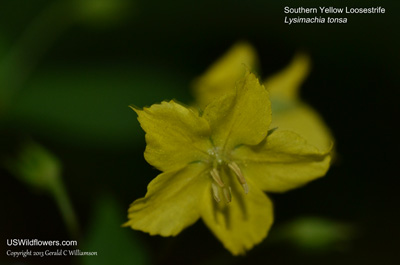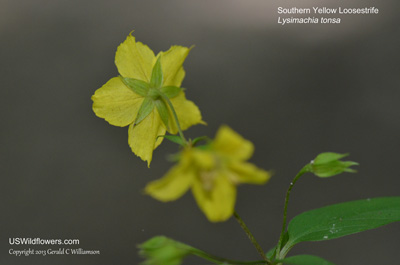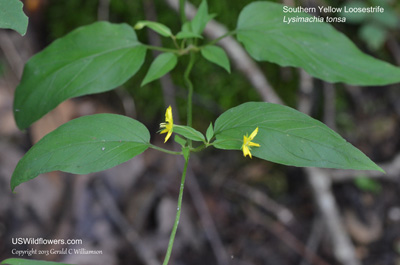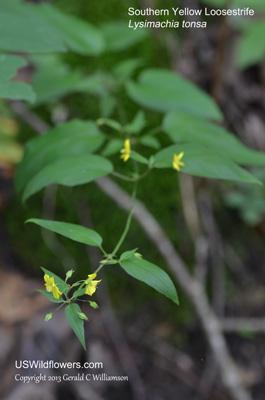Appalachian Loosestrife, Southern Yellow Loosestrife, Southern Loosestrife - Lysimachia tonsa
|
Lysimachia tonsa - Appalachian Loosestrife, Southern Yellow Loosestrife, Southern Loosestrife. Lysimachia is made up of about 180 species worldwide, with about 20 in North America. Although there is at least one Lysimachia in each of the 50 states, most of the North American Yellow Loosestrifes are exclusively in the eastern half of the continent, and L. tonsa fits into that profile, being found only in a few states in the southeastern U.S. While the USDA Plants Database map (and BONAP) don't show this species in either state, there are some publications that indicate that it is found, or at least has been found in the past, in both Texas and Arkansas. It is classified as Rare in North Carolina.
Lysimachia tonsa has been classified as Lysimachia ciliata Linnaeus var. tonsa in the past, and it is quite similar. The most obvious difference between L. tonsa (Southern Yellow Loosestrife) and L. ciliata (Fringed Loosestrife,) which shares similar habitat within the much smaller range of L. tonsa, are the distinctly hairy petioles of L. ciliata. L. tonsa has petioles which may be hairy only near the stem.
Found in:
AL, AR, GA, KY, NC, SC, TN, TX, VA, WV
Leave comments on Lysimachia tonsa at this link. | 
Distribution of Lysimachia tonsa in the United States and Canada:

Blue=Native; Grey=Introduced
Map from USDA Plants Database:
USDA, NRCS. 2017. The PLANTS Database (http://plants.usda.gov, 08 May 2025). National Plant Data Team, Greensboro, NC 27401-4901 USA.
Search Our Database: Enter any portion of the Scientific, Common Name, or both.
Do a general Google search of the entire site:
#ad
 Follow USWildflowers on Twitter
#ad
| | Site: Sitton's Gulch, Cloudland Canyon State Park, Dade County, GA Date: 2013-July-09 | Photographer: Gerald C. Williamson
Nikon D7000
Tamron SP 90MM f/2.8 AF Macro | | The flowers of Lysimachia tonsa are usually solitary at the leaf axils, subtended by leaves that are similarly shaped to the main stem leaves, but are smaller. They are also reported to occasionally occur in a whorl, and that might be the case at the end of the stem of the plant in this photo. | | 
| | Site: Sitton's Gulch, Cloudland Canyon State Park, Dade County, GA Date: 2013-July-09 | Photographer: Gerald C Williamson
Nikon D7000 | | Southern Yellow Loosestrife has 5 yellow petals, sometimes with red coloration at their bases (not in this case), sometimes irregularly toothed (as in this case.) The tip has a sharp point. The poor photo, aside from photographer skill, is due to the dark, moist forest on a mountain slope where I found this plant. The wind was moving the plant, so in order to get a close-up, I used flash. However, there was enough ambient light to provide the ghost image of the flower in a different position. While Lysimachia tonsa can be a plant of dark, moist forest, it can also grow in drier, more open areas such as sandstone bluffs and other rocky areas. | | Click on the photo for a larger image

| | Site: Sitton's Gulch, Cloudland Canyon State Park, Dade County, GA Date: 2013-July-09 | Photographer: Gerald C Williamson
Nikon D7000 | | While Flora of North America says the calyx is not streaked, this photo definitely shows some lines on the narrow calyx lobes. | | Click on the photo for a larger image

| | Site: Sitton's Gulch, Cloudland Canyon State Park, Dade County, GA Date: 2013-July-09 | Photographer: Gerald C Williamson
Nikon D7000 | | The leaves of Lysimachia tonsa are opposite and held on petioles that are up to about 1.75 inches long. While L. tonsa will have hairs at the base of the petiole, this plant did not have the distinctly hairs along the entire length of the petiole as is found in L. ciliata, leading me to the L. tonsa identification. | | Click on the photo for a larger image

| | Site: Sitton's Gulch, Cloudland Canyon State Park, Dade County, GA Date: 2013-July-09 | Photographer: Gerald C Williamson
Nikon D7000 | | Southern Yellow Loosestrife grows up to about 30 inches tall, with erect or somewhat arching stems. The leaves are opposite, and are lanceolate to ovate. The flowers are axillary. | | Click on the photo for a larger image

|
References used for identification and information:
|
|
| |
| #ad
|
|







